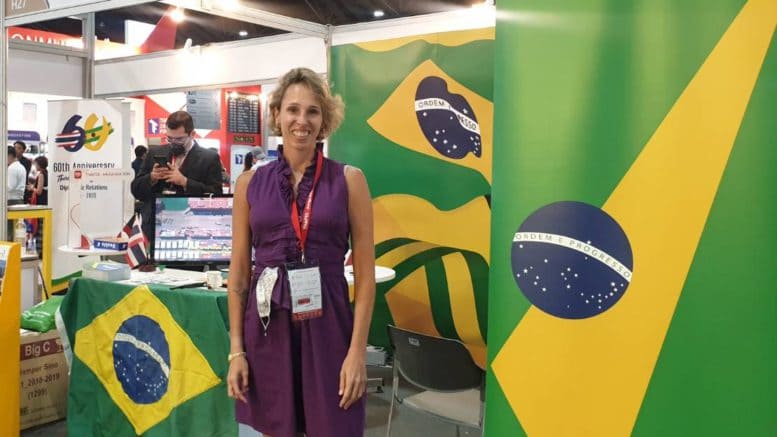High import taxes limit access to Thailand’s market.
Maria Eduarda de Serra Machado is the Agricultural Attaché of Brazil in Bangkok, Thailand. Machado is a veterinarian and Master in inspection and technology of products of animal origin, both degrees by Universidade Federal Fluminense.
AgriBrasilis – What is the profile of agricultural production in Thailand?
Maria Machado – Thailand is the second biggest economy in South Asia, with a GDP of US$ 500 billion (2020). Agriculture is competitive, diversified and specialized, with successful international exports. The country is amongst the major 15 food exporters in the world. Agricultural sector corresponds to approximately 9% of the GDP, with about 40% of the country’s workforce. Most of Thai farmers own less than eight hectares.
Thailand’s agricultural commodities include fish, tapioca, rubber, rice, grains and sugar. Canned tuna, pineapples, frozen shrimp and poultry are highlights because to the rising agro-industrial hub.
AgriBrasilis – What is the importance of trade relations between the agricultural sectors of Brazil and Thailand?
Maria Machado – Thailand is the biggest importer of Brazilian agribusiness in South Asia, following the Asian market trend. Until the first semester of 2021, Thailand imported US$ 1.416 billion, an increase of 27.05% in comparison with 2020. This represents a 2.4% share for Brazil in the country’s trade.
Soybean complex products were the most exported from Brazil to Thailand in the first semester of 2021, with an increase of 26.45% in comparison with 2020. Forest products exports such as leather, beef, cotton, cereals, vegetables, legumes, roots and tubers have also increased.
AgriBrasilis – Recently, Thailand allowed imports of beef from Brazil. What is the importance of this?
Maria Machado – The presence of Brazilian beef in Thailand reinforces our participation in South Asia. The sector sees Thailand as an importer of meat offal, but there is interest in industrialized and premium meat in the country. Thailand is a small market, but it is a fast-growing market for high added value products. That being said, Brazil still has only five establishments approved to export beef to Thailand.
The challenge will be achieving competitive access to Thai market, considering that import taxes applied to frozen beef are 50% and those applied to meat offal are 30%. Brazil does not have a free trade agreement with Thailand or with The Association of the Southeast Asian Nations (Asean)1
Agribrasilis – What is the profile of agricultural imports and exports between both countries?
Maria Machado – Brazil stands out only in commodities such as soybean complex, forest products and cotton, with recent increase of beef exports.
Brazil exports are larger than imports from Thailand. Most exported Thai agricultural products to Brazil are rubber and fish.
AgriBrasilis – Thailand is one of the biggest importers of the soybean complex from Brazil. What other agricultural product exports have potential for growth?
Maria Machado – Brazil has potential growth for products from our biodiversity, such as açaí, that is well-known in Thailand. However, Thai people do not know the fruit is from the Amazon Forest, much less that it is part of a local culture of extractivism, inserted in sociobiodiversity.
Dairy also has market potential in Thailand. Brazilian health and safety certificate was recognized by Thai authorities in 2020. Market is open for dairy products classified as “Prescribed Quality and Standard Foods”.
Dairy products most exported from Brazil to Thailand, between 2017 and 2020, are cheese; milk and cream, concentrated or containing sugar or other sweeteners; milk and cream, not concentrated or not containing sugar or other sweeteners.
Finally, I would like to highlight our special coffee, one of the best to blend with Thai coffee. However, one of the major barriers to expanding the market for coffee are taxes, since the tariff is 90%.
Association of Southeast Asian Nations (Asean)1: Economic bloc formed by Brunei, Cambodia, Singapore, Philippines, Indonesia, Laos, Malaysia, Myanmar, Thailand and Vietnam, in addition to the observer countries Papua New Guinea and East Timor.

